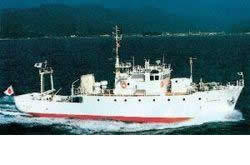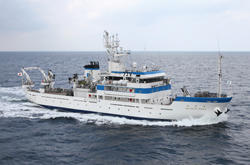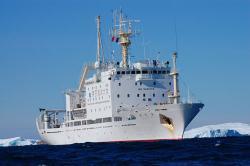Program overview and features
Strengthening practical education through oceanographic observation and marine bioprospecting
- Ship engineers and researchers active on the world's oceans-
Boarding the ship and crossing the stormy waves is the very moment when the sea shows its real face.
The oceans play an important role in global environmental change, therefore, in order to understand and predict such change, the maintenance of global-scale observation systems is needed. Also, while considering preservation of the entire ecosystem and prevention of environmental pollution, and in order to also ensure the continuous usage of marine resources, the investigation of the oceans' biotic resources is indispensable. In this pioneering marine field, it is imperative to train and secure human resources who can actively play an international role in both science and technology.
| Main majors within the educational program |
Doctoral Course
|
|---|---|
|
Master's Course
|
|
| Related majors |
Master's Course
|
Program outline
Aiming to solve the various problems related to global environmental change, the management of marine life and submarine resources and shallow water environmental preservation, the importance of oceanographic observation and marine bioprospecting is increasing more and more. On the other hand, there is an increasing number of researchers who get involved solely in existing data analysis and theoretical research, without having any field experience, a fact that also raises concern about the negative effect of missing important discoveries. These are difficult to achieve by researchers who don't have the experience in observation and research by ship, indispensable especially in ocean field research.
In this program, taking advantage of the characteristic feature of this university, which is having a training ship, through training in observation and research not only along the coast but also in the ocean, through practice and internships on the research ship, opportunities to participate in observation and research in the marine field are created for students enrolled in the Master's and Doctoral Course, who aim at various research fields. Thanks to this, while making them aware of the meaning of field research, they acquire a wide-range of knowledge and advanced skills, and the program aims at fostering ship engineers and researchers who are able to perform well in international collaborative research.
Download the poster (PDF:321K)
The university's training ships, the place for practice in oceanographic investigation
The training ships that cover the waters from coastal areas to offshore, reaching as far as the deep sea and the Antarctic Ocean. The training ships of Tokyo University of Marine Science and Technology, active in oceanographic investigation, become the place to practice.
- Seiyo-maru

Covers the sea areas around Japan, such as Tokyo Bay, Sagami Bay and the Kuroshio Current.
- Shinyo-maru

Carries out training using areas from offshore Japan to the Pacific Ocean and the equatorial ocean in the Indian Ocean as waters for the main practical training and research studies.
- Umitaka-maru

Carries out on-board practical training and research studies in the deep sea of the Pacific Ocean, Indian Ocean and the Antarctic Ocean.
Characteristics of the program
- In addition to a new curriculum, it enhances the training and practice offered to the graduate school students
- Organization and participation in international symposiums carried out voluntarily by graduate school students
Holding seminars to which foreign participants are invited and organizing international symposiums based on plans for observing the Antarctic Ocean and the results of the investigations. - A substantial teaching assistance system
For the practice included in the Master's course, many students enrolled in the Doctoral course go on-board ships as TAs (teaching assistants). In this way, the ships become places for experiencing instruction in education and research. - A substantial internship system
Going on-board ships as assistant investigators in the investigation and research done by partner graduate schools, Fisheries Research Agency, Japan Agency for Marine-Earth Science and Technology, National Maritime Research Institute, Electronic Navigation research Institute and accumulating work experience.





